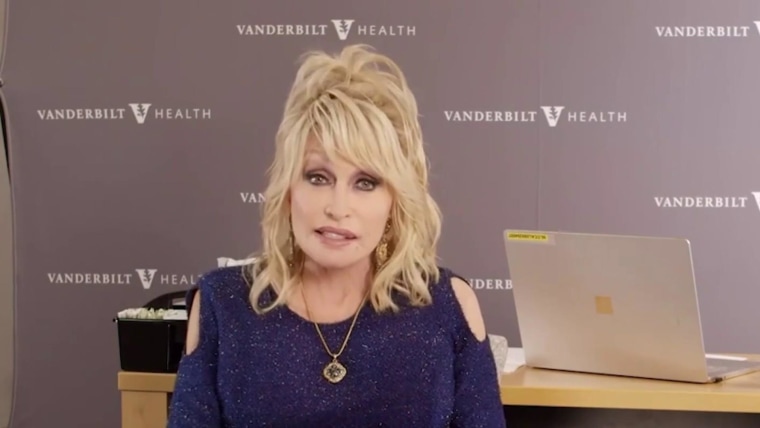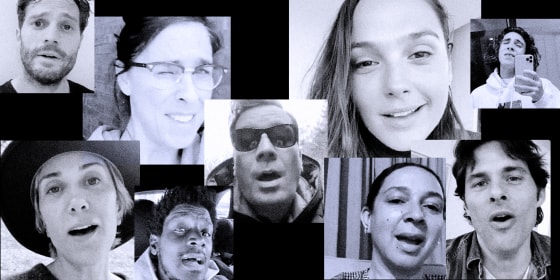The closest comparison I think of for Gal Gadot’s ill-advised pandemic Instagram video, published almost exactly a year ago today, is a video so cringe-inducing my editor said I couldn’t cite it in this column. And I know, such a parallel might seem outrageous given Gadot’s ostensibly wholesome singalong — made possible with help of a couple dozen A-list (and B-list… and C-list) celebrity friends. But the fact remains her video was so unbelievably awkward that it’s almost impossible to make it all the way through, even 12 months later.
Her video was so unbelievably awkward that it’s almost impossible to make it all the way through, even 12 months later.
And yet ironically, Gal Gadot’s video, which has racked up more than 10.5 million views, was meant to inspire. She starts off the three-minute missive she posted just days into most Covid-19 lockdowns by saying she was herself inspired by a video of an Italian man playing the trumpet on his balcony for his quarantined neighbors. She got Kristin Wiig on the phone and the two of them cajoled a rogue’s gallery of famous friends — Sarah Silverman, Will Farrell, Sia, Jamie Dornan, Mark Ruffalo, Maya Rudolph — into singing John Lennon’s famous peacenik ballad.
The immediate internet feedback was that it was tone deaf, and not in the way “The Mandalorian’s” Pedro Pascal croaking through his lyrics is tone deaf. “You might say that every crisis gets the multi-celebrity car-crash pop anthem it deserves, but truly no crisis — certainly not one as vast and unsettling as the current one — deserves this,” Jon Caramanica wrote in The New York Times. The general consensus was that a bunch of rich celebrities imagining a world with “no possessions” while people around the country suffered a social, health and economic crisis wasn’t what the world needed at the time.
The serially smug comedian Ricky Gervais said on BBC Radio 5, “You can see in their eye — ‘I could cry at the beauty of my personality, I’m just so beautiful for doing this’ and everyone sees that — we get it.” While I hate to admit to ever agreeing with Gervais, he nails it here. All of the celebrities were so earnest, thinking that they were uplifting the muggles when they were, in internet parlance, doing the absolute least.
The weeks and months that followed features a series of internet cancellations by locked down masses. We were trapped and looking for trouble. When “Glee” actress Lea Michele tweeted in support of the Black Lives Matter movement, Samantha Ware, a black actress in the show’s final season responded, “REMEMBER WHEN YOU MADE MY FIRST TELEVISION GIG A LIVING HELL?” and accused her of a number of other racially motivated microagressions on set. (Michele later apologized; Ware remained skeptical.)
Something nearly identical happened to Ellen DeGeneres, but without a clear inciting incident. Kevin T. Porter, an L.A. comedian, posted a request on Twitter for people to share their stories of mistreatment by the daytime talk show host who he called “notoriously one of the meanest people alive.” That post has almost 3,000 replies, including a waitress who claims she was almost fired because DeGeneres complained that she had chipped nail polish. Porter said he would donate $2 for each story to the LA Food Bank, but he capped it out at $600 after a flood of stories.
In the past, celebrities expressing political and cultural solidarity — no matter their private lives — might have been enough. But that mentality is changing. Increasingly, we want celebrities to actually do something about the problems they profess to care about. “We Are the World” was a cheesy scourge of ‘80s music that gathered a bunch of celebs to sing a tune. But the sale of the track and officially branded merchandise raised tens of millions of dollars for aid to Africa. Gal’s video raised, I don’t know, spirits? But not even that.

Users of social media are getting tired of performative activism; they want actual receipts from celebrities trying to do good. We want literal angel from heaven Dolly Parton, who donated $1 million to fund vaccine research — research which eventually helped lead to the Moderna shot — and then refused to cut the vaccine line herself. Don’t try to cheer us up; write checks and actually make a difference.
“Sometimes, you know, you try and do a good deed and it’s just not the right good deed,” Gadot said of her video to Vanity Fair in October. “I had nothing but good intentions and it came from the best place, and I just wanted to send light and love to the world.”
Points to Gadot for some self-awareness here. But the world did not need love and light. It needed money. It needed relief. It needed PPE. It needed excess respirators and more hospital beds. If we want love and light, we can just stream “Wonder Woman.” John Boyega arguably put his career on the line giving an impassioned speech at a Black Lives Matter protest in London, which then went viral. That’s what real inspiration looks like.
Imagine if celebrities learned their lessons. It’s easy if you try.

